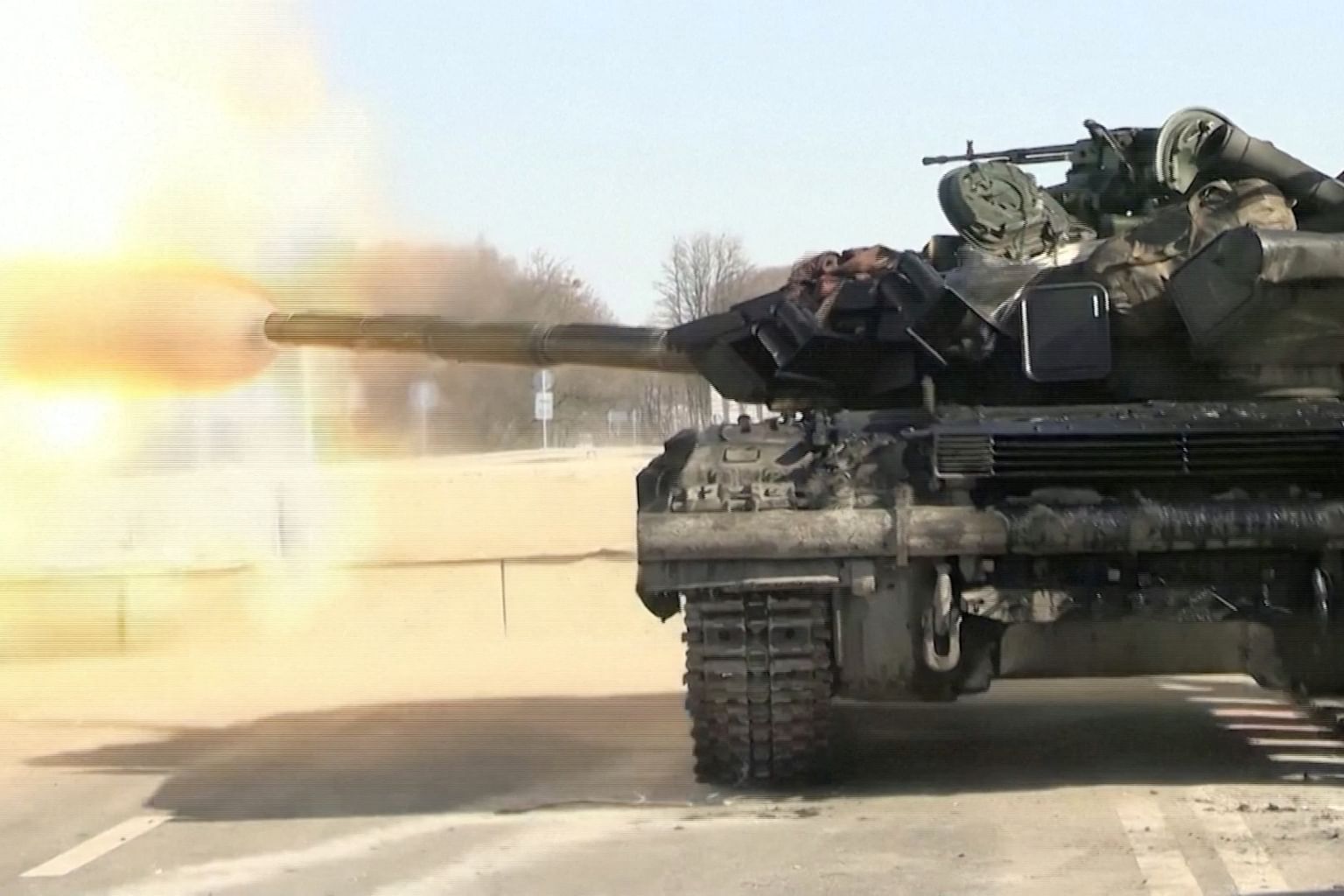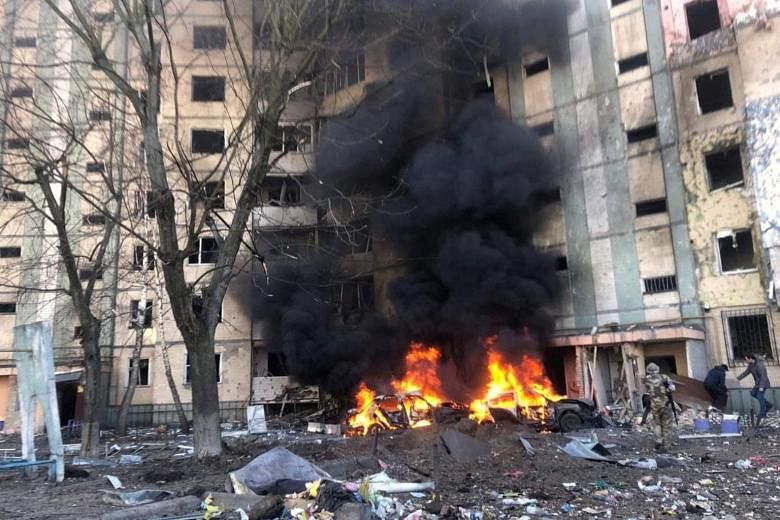NEW YORK (NYTIMES) - In the tense weeks before Russia invaded Ukraine on Feb 24, Russian officials denied that it planned anything of the sort, denouncing the United States and its Nato allies for stoking panic and anti-Russian hatred. When it did invade, the officials denied it was at war.
Since then, the Kremlin has cycled through a torrent of lies to explain why it had to wage a "special military operation" against a sovereign neighbour.
Drug-addled neo-Nazis. Genocide. American biological weapons factories. Birds and reptiles trained to carry pathogens into Russia. Ukrainian forces bombing their own cities, including theatres sheltering children.
Disinformation in wartime is as old as war itself, but today war unfolds in the age of social media and digital diplomacy. That has given Russia - and its allies in China and elsewhere - powerful means to prop up the claim that the invasion is justified, exploiting disinformation to rally its citizens at home and to discredit its enemies abroad.
Truth has simply become another front in Russia's war.
Using a barrage of increasingly outlandish falsehoods, President Vladimir Putin has created an alternative reality, one in which Russia is at war not with Ukraine but with a larger, more pernicious enemy in the West.
Even since the war began, the lies have gotten more and more bizarre, transforming from claims that "true sovereignty" for Ukraine was possible only under Russia, made before the attacks, to those about migratory birds carrying bioweapons.
Russia's message has proved successful domestically, where the Kremlin's claims go unchallenged. Surveys suggest a majority of Russians support the war effort.
Internationally, the campaign has seeped into an information ecosystem that allows them to spread virulently, reaching audiences that were once harder to reach.
"Previously, if you were sitting in Moscow and you wanted to reach audiences sitting in, say, Idaho, you would have to work really hard doing that," said Ms Elise Thomas, a researcher in Australia for the Institute of Strategic Dialogue, referring to disinformation campaigns dating to the Soviet Union.
"It would take you time to set up the systems, whereas now you can do it with the press of a button."
The power of Russia's claim that the invasion is justified comes not from the veracity of any individual falsehood meant to support it but from the broader argument.
Individual lies about bioweapons labs or crisis actors are advanced by Russia as swiftly as they are debunked, with little consistency or logic between them.
But supporters stubbornly cling to the overarching belief that something is wrong in Ukraine and Russia will fix it. Those connections prove harder to shake, even as new evidence is introduced.
That mythology, and its resilience in the face of fact-checking and criticism, reflects "the ability of autocrats and malign actors to completely brainwash us to the point where we don't see what's in front of us," said Ms Laura Thornton, director and senior fellow at the German Marshall Fund's Alliance for Securing Democracy.
The Kremlin's narratives today feed on preexisting views of the war's root causes, which Mr Putin has nurtured for years - and restated in increasingly strident language last week.
The strategy to deceive, or at least confuse, international observers was used after the bombing of a maternity ward in Mariupol on March 9.
Twitter and Facebook eventually removed the posts, but gruesome photographs, stamped "Fake," continued circulating across the Internet, including on chat app Telegram.
Another meme gained even more traction, relying on a yearslong campaign in Russia to stoke unfounded fears that the United States was manufacturing biological weapons in Ukraine.
When Russia took such claims to an emergency meeting of the United Nations Security Council, however, it faced withering criticism.
"Russia has today brought into the Security Council a series of wild, completely baseless and irresponsible conspiracy theories," the British representative, Ms Barbara Woodward, told the council. "Let me put it diplomatically: They are utter nonsense."

Russia's accusations about nefarious US activities in Ukraine date back decades, resurfacing in new forms with each new crisis, like the political upheaval in 2014 that led to Russia's annexation of Crimea.
Ukraine is waging an information campaign of its own, aiming to discredit Russia, exaggerate its own military successes and minimise its losses. It has also circulated false reports of heroism, including the martyrdom of soldiers defending an island in the Black Sea and the exploits of an ace fighter pilot in the skies over Kyiv.
Russia, though, has more tools and reach, and it has the upper hand with weaponry. The strategy has been to overwhelm the information space, especially at home, which "is really where their focus is," said Mr Peter Pomerantsev, a scholar at the Stavros Niarchos Foundation Agora Institute at Johns Hopkins University who has written extensively about Russian propaganda.
Yet when the invasion began, it seemed to catch the organs of the propaganda apparatus unprepared. Officials and state media had just spent weeks accusing the Biden administration of exaggerating what Russia claimed were simply regular military exercises, not the buildup of an invasion force.
"Clearly, they did not prepare the information warfare machine," Mr Pomerantsev said. "It takes months to prepare something like this."
That could explain the changing, disjointed nature of Russia's campaign. The threat of biological weapons in Ukraine - let alone secret American weapons factories producing them there - was not cited as a rationale for the "special military operation" that Mr Putin announced at dawn Feb 24. These falsehoods emerged only later.
"They throw stuff out, and they see what works," said Ms Thomas, the researcher from the Institute for Strategic Dialogue. "And what's really working for them at the moment is the biolabs stuff."
The Kremlin's campaign has gone beyond simply propagating its message. It has moved swiftly to silence dissenting points of view that could cut through the fog of war and discourage the Russian population.
For now, the campaign appears to have rallied public opinion behind Mr Putin, according to most surveys in Russia, though not as high as might be expected for a country at war.
"My impression is that many people in Russia are buying the government's narrative," said Mr Alexander Gabuev, a senior fellow at the Carnegie Moscow Centre. "They have doctored images on state-controlled media. Private media don't cover the war, fearing 15 years in prison. Same goes for people on the social media. Russia has lost information warfare globally, but the regime is quite successful at home."

The question is for how long. Cracks have appeared in the information fortress the Kremlin is building.
A week after the invasion began, when it was already clear the war was going badly for Russian troops, Mr Putin rushed to enact a law that punishes "fake news" with up to 15 years in prison.
Media regulators warned broadcasters not to refer to the war as a war. They also forced off the air two flagships of independent media - Ekho Moskvy, a liberal radio station, and Dozhd, a television station - that gave voice to the Kremlin's opponents.
Access to Facebook, Twitter, TikTok and most recently Instagram has also been severed inside Russia - all platforms the country's diplomats have continued to use outside to misinform.
Once spread, disinformation can be tenacious, even in places with a free press and open debate, like the United States, where polls suggest that more than 40 per cent of the population believes the 2020 election was stolen from former President Donald Trump.
"Why are people so surprised that this kind of widespread disinformation can be so effective in Russia when it was so effective here?" Ms Thornton of the German Marshall Fund said.

